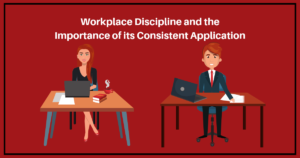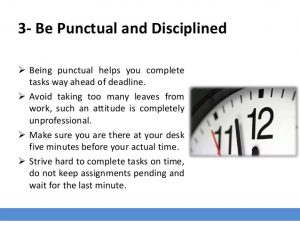
How to ensure better discipline in your workplace?
Discipline in your workplace brings aims and achievement closer.

“Discipline in your workplace is choosing between what you want now and what you want most.”
— Abraham Lincoln

Every business needs to climb the right rung of the ladder to success. It can happen only if you develop a strong discipline and positive work ethic in your office. Creating a disciplined workplace culture or to enure discipline in your workplace is not easy always. You don’t want to become too strict or demanding. It is not a positive approach.
Here are specific ways in which you can develop better discipline in your office while maintaining the respect of employees.
“Discipline in your workplace is the bridge between goals and accomplishment.”
— Jim Rohn

How to develop better discipline in your workplace?

- Be a good leader
Are you the head of the business? Then, it’s your responsibility to act as a leader for the rest of your workforce. Many people are afraid to serve as a leader. They think that it is better to let the employees organise themselves. But most workforces prefers to have someone who can lead them efficiently.
It is not about yelling at people and telling them what to do. It is more about encouragement and helping them to reach their full potential. You can offer guidance when people aren’t sure what the best approach should be.
A leader is a person who pulls everyone in the same direction and resolves disputes calmly.
- Remove distractions
Sometimes, ill-discipline is more to do with people not focusing on the job in hand and instead of being distracted. You should remove all those things from the office that can be a distraction for your people.
These potential distractions could be to do with how the workspace is organised. Or it could be to do with the technology that they are using. It is a good idea to block social media sites in the office because these can act as major distractions for employees.
When people are too busy on their social media sites, they don’t do the tasks that you want them to do. Banning sites might seem harsh in the first place. But it might be necessary.
- Make a pleasant working place
Another thing you can do is improving your workspace. The office should not be a place where people hate being each day. Your employees should walk into the workspace looking forward to what the day has to offer them.
If they are walking in and feeling like they would rather be somewhere else, then you will find it hard to develop a disciplined and productive office space. So, brighten up the office and change how it operates.
You should make it more collaborative so that working for the business is a bit more fun than it was before. It is a relatively small change, but it could make the office a much nicer place to be for your employees.
- Think about the age of the workforce
It is something that many employers don’t even think about. But having a young team means you have to approach the problem differently than the workforce with older ones. You need to tailor your plan to your employees depending on what they respond best to.
Think about their age and personalities. Then, personalise your approach to office discipline. Most people respond better to gentle encouragement and a relaxed approach. And others need a firmer approach to behave in a way that is appropriate for your office. A uniform approach to discipline isn’t always the best option to go for.
“Without self-discipline, success is impossible, period.”
— Lou Holtz
- Make the rules clear
If you want your workforce to follow the rules, they should know exactly what those rules are. You can’t expect your people to follow the rules if you haven’t mentioned to them what they are. So, you should decide what the rules are, to begin with. It is not something that you need to spend too long doing. You should have fewer precise rules. It is much better than having a million rules that no one is going to bother to read.
The rules of your company should ideally fit on one side of the paper. If you are easily accessible to commercial laminating machines, you can print and produce a few copies of the rules. You can exhibit it in the office so everyone can see them.
- Put a three-strikes rule in place
You must have some real consequences for people who deny playing by the rules inside the office.
It makes no sense to follow the rules in place if nothing happens when someone breaks those rules, does it? The best thing to do is to put a three-strike rule in place. It would mean that an employee would be given some warnings before they finally get fired for poor discipline.
Having this kind of procedure will make it clear to everyone what their limits are. People will think twice before doing things that disrupt if they know that there will be consequences of their actions.
- Give people space to work
As an employer, you don’t want to be breathing down the neck of your people all day long. If they feel like they are under pressure to do something, they will be much less likely to do it well. That’s why it is so important to give your people the space they need to work in their own way.
No two people are the same. And they should get the space to build an approach to their task that they are comfortable with. If you aspire to get the most out of employees, you should allow them this kind of independence.
- Prioritise communication with employees
You can create a disciplined office only if you are prepared to keep the lines of communication with your employees open. Employees should feel like they can communicate with you and air their worries as they arise.
This type of communicative culture is a very healthy thing to have. So, never underrate how important it can be. It can turn out to be one of the most powerful things about your entire business. But first of all, you need to make it very clear to everyone that you are willing to listen to them whenever they have something important to share.
“One of the most important keys to success is having the discipline to do what you know you should do, even when you don’t feel like doing it.”
— Unknown




